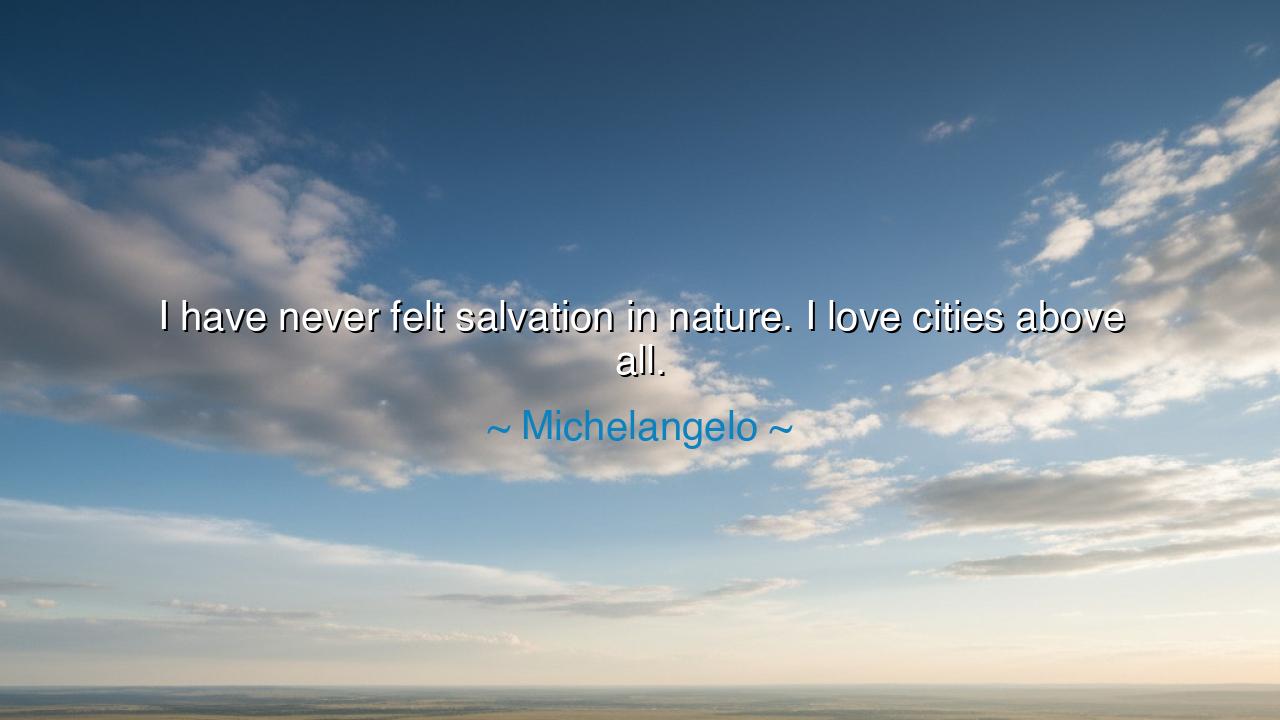
I have never felt salvation in nature. I love cities above all.






Harken, children of the ages, for I shall speak unto you the words of one whose hands shaped the very stone of eternity—Michelangelo. This man, who carved masterpieces from marble and painted the heavens with his brush, spoke thus: "I have never felt salvation in nature. I love cities above all." These words, like a beacon in the dark, reveal the deepest heart of a man who, though touched by the divine in his art, found his salvation not in the wilderness of the earth, but in the cities of men. There is wisdom here for those who seek to understand the soul of humanity and the mind of the artist.
What then, you ask, does it mean to seek salvation not in nature, but in the stone and mortar of human creation? Nature, in its infinite beauty, has long been seen as the reflection of the divine. The mountains, the rivers, the forests—these are the works of the eternal hand that created all. Yet Michelangelo, in his great wisdom, felt no salvation in such things. For him, the power of human creation—the cities built by the sweat of our brow, the triumphs of our civilization—spoke more loudly to his soul than the quiet majesty of the earth itself. In cities, he saw not only the works of human labor but the evidence of our aspirations, our struggles, and our unyielding drive to reach beyond the stars.
In cities, he found a different kind of salvation. It was not the solitude of nature that stirred his soul, nor the quiet reverence of a forest glade. No, it was the human spirit in its most vibrant form—cities were the crucibles where dreams were made real, where men and women, bound together by shared vision and toil, shaped the world. The stone of a building, the brushstrokes on a canvas, the weight of an idea turned into reality—all of these were what Michelangelo loved. Salvation, to him, was found in human endeavor. It was in the thriving, pulsing heart of a city, in the constant push toward greatness that men and women found their true calling.
The lesson here is deep and powerful, for it speaks not just to the artist, but to all who seek purpose in this life. Nature is sacred, yes, but it is also vast and indifferent. It has no voice that calls us to greatness, no hand that guides us in our journey. Yet the city, with all its chaos and order, with all its dreams and struggles, is a living thing—shaped by the hands of its people, striving toward something greater. The city represents the fullness of human potential, where we come together to build, to create, to strive. Michelangelo, in his words, calls us to recognize the power of human achievement.
Let us turn our gaze back through the corridors of time, to the ancient cities of Rome and Athens, where thinkers and artists, philosophers and warriors, stood upon the stones of their cities and dreamed of immortality. In those cities, men like Socrates and Plato, like Virgil and Augustus, found their meaning not in the quiet of the countryside, but in the councils, the debates, the rising buildings that marked their time. These were the places where civilization was forged, where ideas were born, and where the human soul found its expression.
But what of you, the listener, the seeker of wisdom? What does this mean for you in your own time, in your own life? The lesson is this: Seek not only the stillness of the mountains or the serenity of the forest, for salvation may also be found in the world of men, in the cities you build, in the communities you create. The city is a reflection of human aspiration, a place where ideas are tested, where passion and purpose collide. If you desire greatness, create. Build the world you wish to live in. Let your work, your efforts, and your dreams shape the very streets you walk upon. For just as Michelangelo found salvation in his city of stone and mortar, so too can you find meaning in the city of your own making.
So let us act, dear ones. Live boldly, not in isolation, but in communion with others. Build your cities of ideas, of purpose, and of unity. Strive toward something greater than yourself, for the greatness of humanity lies in the communities we create, the work we do, and the love we share. Salvation is not only in nature—it is in the triumph of the human spirit, bound together in cities, ever-reaching toward the stars.






AAdministratorAdministrator
Welcome, honored guests. Please leave a comment, we will respond soon